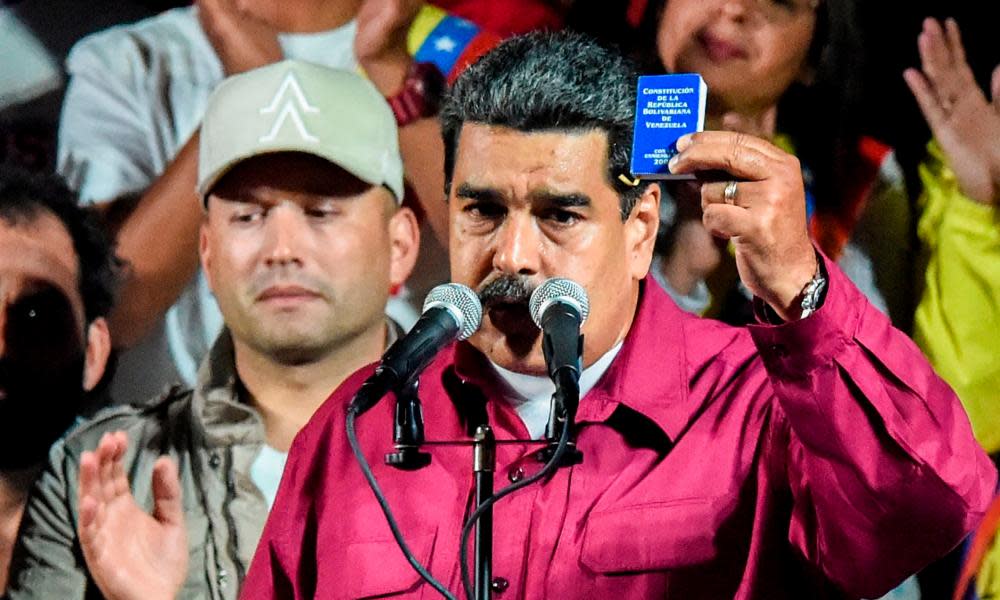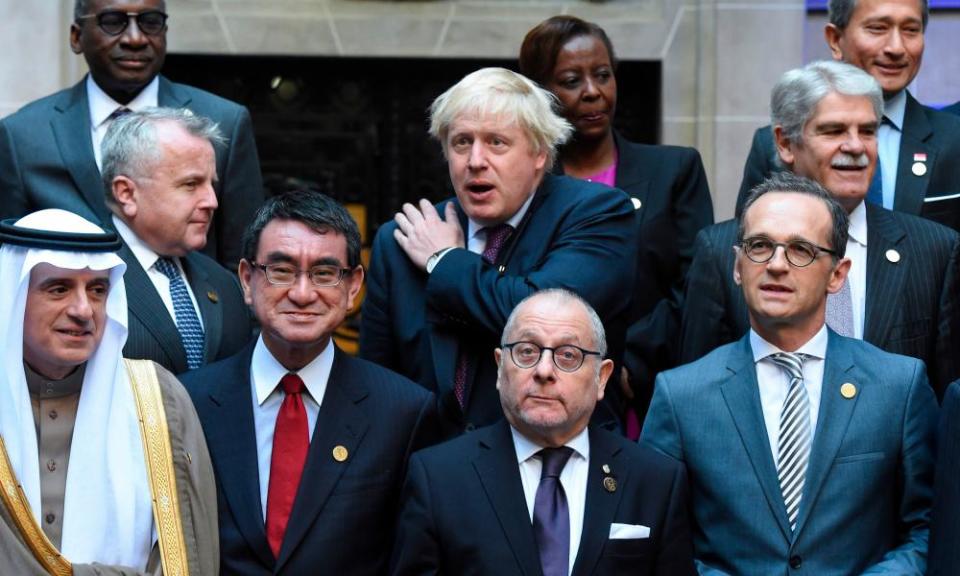Boris Johnson: Labour refusing to face reality over Venezuela regime

Boris Johnson, the UK foreign secretary, has sought to turn the crisis in Venezuela to the Conservatives’ political advantage, accusing the Labour leadership of a “refusal to face reality” over the nature of the regime in Caracas.
Nicolás Maduro, who has overseen rocketing unemployment and hyperinflation, was re-elected president on Sunday after a poll widely condemned by the international community as unfair.
Speaking in Buenos Aires, where he is attending a meeting of G20 foreign ministers, Johnson said the election was, “deeply flawed” and had “further eroded Venezuelan democracy”.
Maduro succeeded Hugo Chávez, for whom Jeremy Corbyn, the Labour leader, and John McDonnell, the shadow chancellor, have expressed admiration in the past. When Chávez died in 2013, Corbyn said he had made “massive contributions” to a “very wide world”.
Thanks Hugo Chavez for showing that the poor matter and wealth can be shared. He made massive contributions to Venezuela & a very wide world
— Jeremy Corbyn (@jeremycorbyn) March 5, 2013
Speaking in Davos in January, McDonnell said: “All the objectives of Chávez, in terms of tackling inequality, investing in education, developing people’s skills, would have been successful if they had mobilised the oil resources to actually invest in the long term and work with private sectors as well.”
Chávez became increasingly authoritarian during his 14 years in power. Human Rights Watch has argued that, by his second term, “the concentration of power and erosion of human rights protections had given the government free rein to intimidate, censor and prosecute Venezuelans who criticised the president or thwarted his political agenda”.
Johnson said Labour’s praise for Chávez – and ambivalence about his successor – indicated “a refusal to face reality”.
He said: “[Venezuela is] an absolutely tragic story of a people kept in hostage to a defunct ideology: a ghastly command economy, state socialism, the entire oil reserves in the hands of the state, the country going to wrack and ruin. A humanitarian crisis that’s spilling out into the region.
“It is incredible that these people should seriously think that that is the right foreign policy for the UK. It’s coming to this area and talking to people who have to deal with the reality of what’s happening in Venezuela that brings that home.”
McDonnell told the BBC’s Andrew Marr Show on Sunday the country had taken a “wrong turn” after Chávez stepped down. “I think unfortunately since then I don’t think they have been following the socialist policies that Chávez was developing,” he said.
Johnson said McDonnell’s remarks “remind me of those deluded people who used to claim the problem with Soviet Russia is that they never really practiced communism”.
He contrasted what he claimed was Labour’s sympathy with Maduro with its scepticism about Donald Trump’s forthcoming visit to the UK.
“It is striking that you’ve got, as I said, the Labour opposition refusing to condemn Maduro but lining up to denounce the visit of our closest, most trusted, most important ally. It is beyond satire; it is a paradox.”

Johnson called on Caracas to allow humanitarian aid to reach the population. “I remain deeply concerned by the man-made humanitarian and economic crisis, which is growing worse by the day,” he said. “I urge the Venezuelan government to take immediate action and let the international community deliver essential food and medicines.”
Food shortages and rocketing unemployment have resulted in thousands of refugees flooding into neighbouring countries.
The International Monetary Fund estimates that up to one third of the workforce is unemployed, while annual inflation is running at more than 13,000%.
Johnson suggested fresh economic sanctions could be imposed, as Venezuela’s neighbours struggle to cope with a mounting refugee crisis.
“We will be talking about what we can do,” he said. “The feeling I get from talking to my counterparts is that they see no alternative to economic pressure – and it’s very sad because obviously the downside of sanctions is that they can affect the population that you don’t want to suffer.
“But in the end, as one politician in this area said, things have got to get worse before they get better – and we may have to tighten the economic screw on Venezuela.”
The foreign secretary went on to suggest that leaving the EU would strengthen Britain’s hand in tackling rogue regimes in countries such as Venezuela.
“One thing we will be able to do post-Brexit is obviously have our own sanctions regime. We will be able to do things differently. The United States has a different sanctions regime on Venezuela. We won’t necessarily have to march in lockstep with the EU”.
Johnson was also asked about reports that cabinet wrangling over Brexit could force Theresa May to call another general election in the autumn.
He dismissed the idea, saying: “We had a general election in June last year, which followed hard on the heels of a referendum, which itself followed hard on the heels of an election in 2015.
“I think the British public deserve a break from politicians. And my thoughts are very much with that wonderful woman Brenda” – a reference to the Bristol woman who reacted to the general election by telling the BBC in a video clip that went viral: “Not another one. Oh, for God’s sake. Honestly, I can’t stand this. There’s too much politics going on at the moment. Why does she need to do it?”
A Labour spokesperson declined to comment.

 Yahoo News
Yahoo News 
